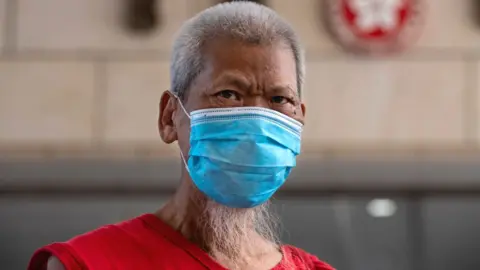Hong Kong: Activist with cancer jailed for Olympic protest attempt
 Getty Images
Getty ImagesHong Kong authorities have sentenced an activist with stage four cancer to nine months in jail for his attempt to protest against the Beijing Olympics.
Koo Sze-Yiu, 75, was arrested by police in February before he could carry out a solo demonstration criticising China.
The veteran campaigner had planned to display a coffin with slogans outside Beijing's liaison office on the first day of the Winter Games.
He was charged with sedition, which he has denied.
The charge carries a maximum two-year prison sentence. The court sentenced him to nine months but Koo said he would appeal the sentence.
Police said Koo had planned to hold up a coffin and signs bearing messages including: "Democracy and human rights are above the Winter Olympics".
Judge Peter Law said those actions constituted a threat to national security, independent news outlet Hong Kong Free Press reported.
Koo is expected to be eligible for early release next month, according to news site SCMP, as he has been remanded in custody since February. He has been arrested for his political activism nearly a dozen times before.
He is the latest activist to be sentenced in Hong Kong, which has over the past few months seen numerous pro-democracy activists sentenced - many of whom were charged with breaking the controversial national security law (NSL).
Beijing enacted the NSL in July 2020 to "restore order and stability" to Hong Kong, following massive pro-democracy demonstrations and riots the previous year.
But critics say the broadly worded criminal law has in effect suppressed all political dissent against China's increased control over the city. They say it has also severely curtailed civil freedoms - like freedom of expression and the right to protest - previously allowed in Hong Kong.
Since July 2020, more than 185 people have been arrested by Hong Kong authorities under the NSL alone, including pro-democracy lawmakers and business figures critical of Beijing.
Earlier this year, the sedition charge was also brought against media executives of news site Stand News and five speech therapists accused of conspiring to publish "seditious materials" after publishing a series of children's books.
According to a Reuters report, the charge of sedition, which stems from colonial-era laws, had previously not been in use in Hong Kong since the mid 1960s.
